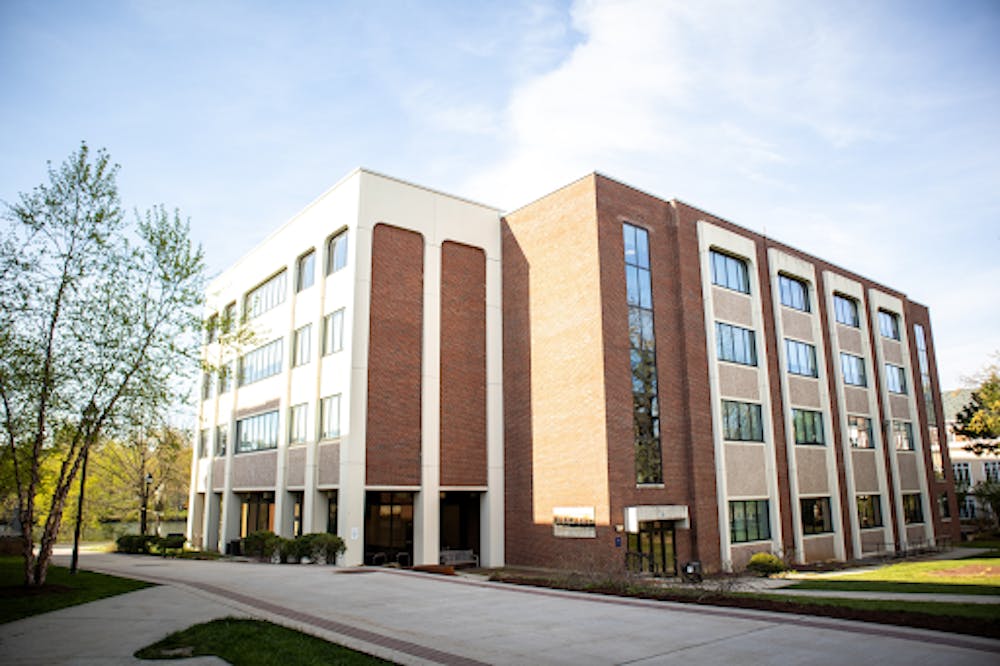By Tristan Weisenbach
Managing Editor
This story was produced in collaboration with CivicStory and the New Jersey Sustainability Reporting Hub as part of the Ecology-Justice Reporting Fellowship.
In line with the College’s long-term sustainability goals, Forcina Hall is tentatively set to undergo renovations this fall that will reduce its energy consumption and provide a better learning and working environment for students and faculty. The academic building currently houses classes for computer science and nursing, among other programs and offices.
Funded by a $33 million grant from the state’s Office of the Secretary of Higher Education, the renovations will align some aspects of the building with the U.S. Green Building Council’s LEED certification program, which sets sustainability and energy-saving standards for buildings. Planned initiatives include switching to LED lighting, reducing water usage, upgrading indoor climate control tools and improving indoor air quality.
Improving the building’s energy efficiency is paramount to the project — part of the College’s goal to become carbon-neutral by 2040. A key to that goal is the on-campus power plant and solar power system, which save costs and produce energy more sustainably.
“We're doing a lot of what we do in terms of the supply end of the equation, which is done in the powerhouse,” said Paul Romano, the College’s senior director of sustainability and energy management. “Those who are on campus are largely unaware, although we hope to raise the profile of those efforts.”
Though implementing a new lighting system promises to be one of the project’s larger components, the College believes that it’s worth the effort — so much so that it has already begun replacing lights in other campus buildings.
“Not only do they consume less power to produce an equivalent amount of lumens or illumination, but they also produce less heat and have much longer service lives,” said Romano.
According to Campus Architect Maggie Greco, the building is also scheduled to receive new restrooms with fixtures that limit water usage. During the construction process, the College will also require the selected contractor to divert at least 50% of demolition waste away from incineration plants and landfills.
Another component of the renovation involves creating an academic space to house the entirety of the nursing department, which is currently split between Forcina Hall and Trenton Hall on opposite sides of campus. Once completed, the new space will add an additional nursing simulation lab next to one that already exists in Forcina.
“We're bringing the lab over from the basement of Trenton Hall, and we're pretty much stamping it, making a secondary one directly beside it,” said Chelsea Lebo, the nursing department’s simulation coordinator. “So that's big because, with increased enrollment, we need more space. But we can also have two labs running at the same time; we can close the doors to create separate spaces or we can open them for one fluid space.”
In addition to the new lab space, the nursing department is also upgrading their simulation mannequins, including adding one that gives birth — something the department currently does not have. According to Lebo, the nursing department chose two companies to provide the new mannequins: Laerdal and CAE. She said one reason these companies were chosen is because they both have their own sustainability reports.
In addition to their many ecological benefits, sustainable building practices serve the College’s interests, according to Dr. Katie Hooven, associate professor of nursing. Hooven believes that updated facilities and nursing technology will make the College’s program more attractive to prospective students.
“I feel like we're trying to market our program as innovative, and nursing is an in-demand program,” Hooven said. “And so when you bring students, or even potential parents and prospective students, into the old outdated classrooms, it doesn't scream that we are up with cutting-edge technology or that we are advanced or innovative.”
At least some of the new nursing classrooms in Forcina will be smart classrooms fit with new computer and projector systems, according to Hooven. She says the department currently does not have any smart classrooms of its own.
The College’s Department of Computer Science will also be getting an upgraded fourth floor, according to Department Chair Andrea Salgian. In addition to new classroom space, the existing computer labs will be upgraded to accommodate new student needs while saving energy. Salgian added that many students now opt to use their own laptops during class, so there is less of a need for energy-consuming computer stations.
“If we don't need them, they're literally just sitting there, and half the time they're actually turned on,” Salgian said.
The renovations are tentatively scheduled to begin in September 2024 and be completed in December 2025, according to Greco. However, the timeline may change once a contractor has been selected for the project.
Despite the wear and tear visible throughout Forcina Hall today, the building has a bright, sustainable future ahead.
“It's almost hard to imagine that it's going to be a space that we're going to like,” Salgian said. “But from what I saw in the designs, it looks like it's going to be something that we will all like, and we're going to love hanging out there.”







